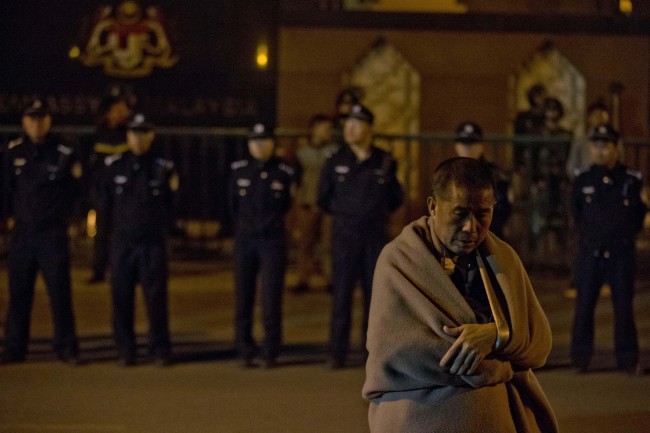Sympathy for MH370 passengers’ families starting to run out
By Korea HeraldPublished : April 29, 2014 - 19:50
Carrying the same signs, wearing the same T-shirts and taking the same 3.8 km route to the Malaysian Embassy in Beijing, anguished families of Malaysia Airlines Flight MH370 passengers staged their second protest march in a month last Thursday.
But unlike their March 25 march in protest against Malaysian Prime Minister Najib Razak’s remarks that the Malaysia Airlines (MAS) jetliner had “ended in the South Indian Ocean,” the latest march was not as widely reported by the media nor backed by Chinese netizens.
About 60 relatives camped outside the embassy all night, ringed by Chinese security officers and ignored by the Malaysian Embassy staff. After about 15 hours, they returned empty-handed to their hotels, unlike the first protest that yielded a meeting with the Malaysian envoy.
When they posted on their Weibo ― China’s Twitter-like microblog service ― account that the Malaysian government had broken its promise of holding regular briefings, one response summed up what Chinese netizens thought of the relatives and their dramatics: “There are no updates, so meet you for what?”
But unlike their March 25 march in protest against Malaysian Prime Minister Najib Razak’s remarks that the Malaysia Airlines (MAS) jetliner had “ended in the South Indian Ocean,” the latest march was not as widely reported by the media nor backed by Chinese netizens.
About 60 relatives camped outside the embassy all night, ringed by Chinese security officers and ignored by the Malaysian Embassy staff. After about 15 hours, they returned empty-handed to their hotels, unlike the first protest that yielded a meeting with the Malaysian envoy.
When they posted on their Weibo ― China’s Twitter-like microblog service ― account that the Malaysian government had broken its promise of holding regular briefings, one response summed up what Chinese netizens thought of the relatives and their dramatics: “There are no updates, so meet you for what?”

Other comments were more pointed. When the families posted asking for Good Samaritans in the area to bring them food and drink during their all-night sit-in, some pointed out that they had been given 31,000 yuan ($4,957) each in spending money by MAS, and their meals and lodging in four-star hotels have been sponsored for the past six weeks.
There were 153 Chinese nationals among the 239 people on the ill-fated flight that has remained missing since disappearing on March 8 on the journey from Kuala Lumpur to Beijing. About 500 relatives of the Chinese passengers are in Beijing.
Analysts cite several reasons for the change in attitude among the Chinese netizens and the Malaysian authorities to the relatives. Unlike in the first few weeks of the families’ ordeal, when the missing flight dominated every headline and coffee shop conversation, the world has moved on to fresher tragedies.
Chinese cyberspace, sloshing with nationalistic vitriol for the Malaysians’ handling of the aviation mystery in its immediate aftermath, has mostly lost interest.
“The families want more attention, but everyone knows that the Malaysian government is already placing this as the highest priority, so their demands can seem irrational,” noted Renmin University’s media expert Yu Guoming.
“The media cannot be expected to bring attention to something where there has been no development.”
Analysts say that while the Malaysian government’s bungled and conflicting accounts have given family members reason to be suspicious of the authorities, the relatives have also played up their victimhood to the point of losing sympathy.
Also, as attention waned in the last few weeks, the families were deemed to have resorted to manipulative methods ― such as starting a mass “prayer session” with candles just before daily briefings ― aimed at ensuring embattled Malaysian officials appeared every day before a sobbing audience wild with emotion.
“At first, there was a lot of sympathy and support for the families and their protests,” said Beijing Institute of Technology sociologist Hu Xingdou.
“But now, with no evidence that the Malaysians are hiding the truth, continuing with this sort of behavior is starting to damage the reputation of Chinese in general, and their personal reputation in particular.”
By Rachel Chang
(The Straits Times)
-
Articles by Korea Herald






![[KH Explains] How should Korea adjust its trade defenses against Chinese EVs?](http://res.heraldm.com/phpwas/restmb_idxmake.php?idx=644&simg=/content/image/2024/04/15/20240415050562_0.jpg&u=20240415144419)












![[Today’s K-pop] Stray Kids to return soon: report](http://res.heraldm.com/phpwas/restmb_idxmake.php?idx=642&simg=/content/image/2024/04/16/20240416050713_0.jpg&u=)